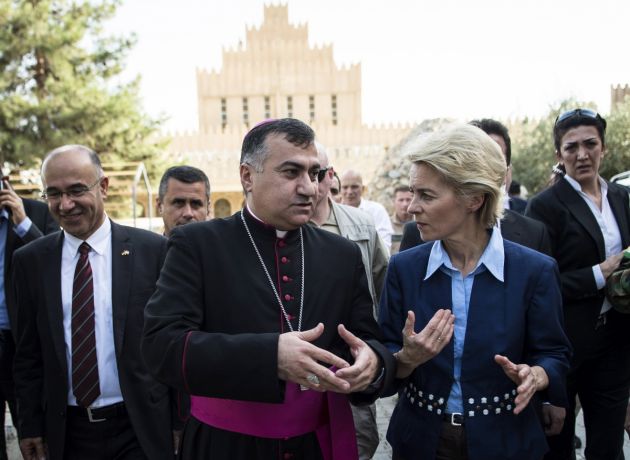Chaldean leader urges Anglican synod to back persecuted Middle East Christians

The Chaldean Catholic Archbishop of Erbil, in a speech at an Anglican gathering, has appealed for aid to support the provision of shelter for thousands of Christian refugees driven from different parts of Iraq by extremists from the Islamic State.
Speaking before the General Synod of the Church of England on Feb. 10, Archbishop Bashar Matti Warda reiterated the specter of worsening condition for Middle East Christians, who have sought refuge in nearby countries.
"Christianity in Iraq is going through one of its worst and hardest stages of its long history that dates back to the first century," he said, in a speech in which he outlined waves of persecution Christians have faced over 100 years.
"It is an understatement for me to simply say that we are in desperate need of financial and material support so that our families may stay and survive, or depart and survive," Warda told the meeting of the Anglican group.
"This crisis is one of chronic urgent need," said the cleric whose church is in communion with the Roman Catholic Church.
Bashar underscored how the Chaldean Church is suffering from the exodus of their brethren and from information that some centuries-old structures and others symbols of faith are "dissolving in front of our eyes."
He noted that in recent decades Christians in Iraq had been forced to flee their homes or to immigrate three times, on each occasion leaving behind a history and a culture that many sought to suppress and wipe out.
"Many Christian people in many villages faced upheavals that followed World War II. Before that, we were victims of acts of genocide at the hands of the Ottoman Turks during the Massacre of Seifo 1915, and then the Massacre of Semele in 1933 at the hands of the Iraqi army.
"During the Kurdish Uprising in 1961 and the Soriah Uprising in 1969, we were forcibly evicted from the numerous villages and towns, and resettled in Baghdad and Mosul," said the archbishop.
'ACTS OF GENOCIDE'
"Acts of genocide," both organized as well as in the form of displacement continued unabated starting from Basrah, Baghdad, Mosul, and Kirkuk in the aftermath of the regime change in 2003 during the ousting of the dictator Saddam Hussein.
"They were crowned by the Massacre of the Church of Our Lady of Salvation in Baghdad in October 2010 during which the Christian worshippers were killed in cold blood.
"This was followed by acts of terrorism and displacement in June and August 2014 the year that witnessed the worst acts of genocide experienced by us in our homeland.
"We are now facing the extinction of Christianity as a religion and as a culture from Mesopotamia," warned Bashar.
"For the Chaldean Church, and our sister churches of the East, the persecution our community is enduring is doubly painful and severe. We are personally affected by need and by the reality that our vibrant church life is dissolving in front of our eyes," the church official said.
While priests and the church hierarchy could only do so much encouragement and counselling, reality dictates that some members opt to take "such a momentous, and perhaps perilous, decision" of leaving their homeland.
Since last year, more than 125,000 Christians have been forced to leave their towns and villages as members of the Islamic State have sought to establish a caliphate in the area using terror for their aims.
Threatened with death if they did not convert, Christians have left their possessions, bringing only themselves and clothes they were wearing as they have sought to make their way to safe havens.
Warda conceded that the fate of Christians would be determined on how the world responds to the crisis.
"I cannot repeat loudly enough that our well-being, as a historic community, is no longer in our hands," he pointed out. "The future will come, one way or the other, and for us this means waiting to see what sort of aid arrives."
Warda encouraged donors to support projects of the Chaldean Church, particularly in providing funds to cover the houses rented for the refugees. He also looked at the possibility of building shelters on church land.
"With your help it will allow families a more stable environment and enable them to seek suitable jobs locally, even as they make long-term plans regarding immigration," he said. "Your help with implementing this short-term and long-term solution is very neces
sary."